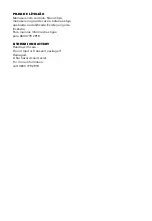
14
EN
i) Battery pack needs to be charged before
use. Always refer to this instruction and
use the correct charging procedure.
j) Do not maintain battery pack on charge
when not in use.
k) After extended periods of storage, it may
be necessary to charge and discharge
the battery pack several times to obtain
maximum performance.
l) Battery pack gives its best performance
when it is operated at normal room
temperature (20°C ± 5°C).
m) When disposing of battery packs,
keep battery packs of different
electrochemical systems separate from
each other.
n) Recharge only with the charger specified
by manufacturer . Do not use any charger
other than that specifically provided for
use with the equipment.
A charger that is
suitable for one type of battery pack may create a risk
of fire when used with another battery pack.
o) Do not use any battery pack which is not
designed for use with the equipment.
p) Keep battery pack out of the reach of
children.
q) Retain the original product literature for
future reference.
r) Remove the battery from the equipment
when not in use.
s) Dispose of properly.
GENERAL SAFETY
WARNINGS
WARNING: Read all safety warnings
and all instructions.
Failure to follow the
warnings and instructions may result in electric shock, fire
and/or serious injury.
Save all warnings and instructions for future
reference.
-
This appliance is not intended for use by persons
(including children) with reduced physical, sensory
or mental capabilities, or lack of experience and
knowledge, unless they have been given supervision or
instruction concerning use of the appliance by a person
responsible for their safety.
-
Children should be supervised to ensure that they do
not play with the appliance.
ADDITIONAL SAFETY
INSTRUCTIONS FOR
YOUR BATTERY
CHARGER
1. Do not charge a leaking battery.
2. Do not use chargers for works other than those for
which they are designed.
3. Before charging, ensure your charger is matching the
local AC supply.
4. For indoor use, or do not expose to rain.
5. The charging device must be protected from moisture.
6. Do not use the charging device in the open.
7. Do not short out the contacts of battery or charger.
8. Respect the polarity “+/-“ when charging.
9. Do not open the unit and keep out of the reach of
children.
10. Do not charge the batteries of other manufactures or
ill-suited models .
11. Ensure that the connection between the battery
charger and battery is correctly positioned and is not
obstructed by foreign bodies.
12. Keep battery charger’s slots are free of foreign objects
and protect against dirt and humidity. Store in a dry
and frost-free place.
13. When charging batteries, ensure that the battery
charger is in a well-ventilated area and away from
inflammable materials. Batteries can get hot during
charging. Do not overcharge any batteries. Ensure that
batteries and chargers are not left unsupervised during
charging.
14. Do not recharge non-rechargeable batteries, as they
can overheat and break.
15. Longer life and better performance can be obtained if
the battery pack is charged when the air temperature
is between 18
o
C and 24
o
C. Do not charge the battery
pack in air temperatures below 4.5
o
C, or above 40.5
o
C.
This is important as it can prevent serious damage to
the battery pack.






































